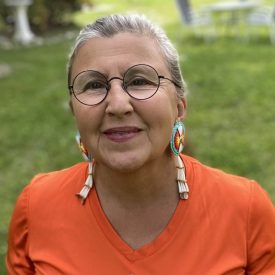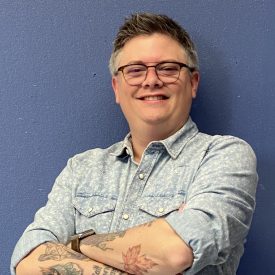Full Circle for Indigenous Education is a name that speaks of our Spirit partners, and the gifts and capacities that are developed as a life form matures. Through learning and challenge, wisdom is accumulated from all parts of the journey, and finally that life form comes home to remembering who she is, and why she is here. This name has been independently received from two different Grandmothers and has been gratefully honoured in Ceremony and has been Feasted.
It is our intention to support learning in regard to history, culture, language, Indigenous pedagogy and Indigenous Ways of Knowing and Being. Through that learning, the growth of the whole person is supported, and the full story of our shared history is acknowledged. Within that growth, we move closer to reclaiming lost aspects of self, family, community and healthy relationships with ourselves and all that surrounds.

As an Indigenous organization, we have sought support and partnership from the Spirit World through Ceremony and listening to guidance. A Red Tree in a Circle with a Blue Background stepped forward and offered 3 concepts that would be our foundation, and the ground from which all intentions and actions are to spring.
Thank-you to All Nations Print for the beautiful logo design.

Our Council and Working Group work to make decisions by consensus, in relationship with Spirit, and with guidance from our Council’s Grandmother.

Pahan PteSanWin is a Red
River Métis citizen from the Klyne and Paul families of Willowbunch,
Saskatchewan. Pahan, co-chairs the University of Manitoba’s Respectful
Rematriation and Repatriation Ceremony, along with Drs. Lara rosenoff Gauvin and
Cary Miller. From three decades of work as a counselling therapist to Indian
Residential School survivors and their families, and in the role of Elder at
Stony Mountain Institution and Grandmother at the Manitoba Youth Centre, Pahan
is knowledgeable about the consequences of trauma that require courage and
effort to heal. In 2016, Full Circle awarded Pahan the “Honouring Our Elders
Award”. She is currently in doctoral studines in the Department of Indigenous
Studies at the University of Manitoba after completing a Master of Social Work
degree based on Indigenous Knowledges. www. Bearpawtipi.ca

Laura Forsythe, Ph.D. is a Michif Assistant Professor at the University of Winnipeg in the Faculty of Education. Forsythe’s research focus is Métis-specific contributions to the academy, Métis inclusion efforts, Métis research methodologies, and educational sovereignty. With five co-edited collections, the Metis Awareness Mondays Series, and the circle of editors of Pawaatamihk: Journal of Metis Thinkers, Forsythe has helped lift up Indigenous scholars’ work for over a decade. She is also the elected Bison Local Chairperson of the Manitoba Metis Federation, the official democratic and self-governing political representation of the Red River Metis. Her kinship ties include the Huppe, Ward, Berard, Morin, Lavallee, and Cyr lines. Her ancestors worked for the Northwest and Hudson’s Bay Companies, fought in the Victory of Frog Plain, and owned Lot 31, the site of a contemporary Métis space called Pakan Town

Marika Schalla, Waabishkaanakwadikwe – White Cloud Woman, is a Red River Metis and Anishinaabe award-winning educator, curriculum developer, author, workshop facilitator and mother of two from Treaty One Land. Marika grew up in Winnipeg’s North End and spent most of her childhood in her family’s home community of Saint Laurent, Manitoba. Marika has an inherit passion for Indigenous education. Marika is a dedicated teacher who is continuously learning and growing in her practice. In 2022, Marika was the recipient of Indspire’s Guiding the Journey award for Innovative Practice. In early 2023, Marika was marked as Indigenous Educator of the month by the Government of Manitoba. In the summer of 2023, Marika’s debut children’s book Stella Welcome to Your Doodem was released.

Mike Johnston is a proud Métis Public School Teacher, Indigenous Education and Land Based Learning Specialist. Born and raised in Treaty One territory, he has adventured through his education career, being named a National Geographic Grosvenor Teacher Fellow and working with both the National Geographic education department and the National Film Board of Canada, among others. Mike is also a champion slam poet, poetry education advocate and author of the best selling educational resource book; You Are Poetry – How to see and grow the poet in your students and yourself.

Lucy Delgado, PhD, is a Two-Spirit Métis woman, born and raised in Winnipeg, Manitoba and an active member of the Two-Spirit Michif Local of the Manitoba Métis Federation. Her family were Sinclairs, Cummings, Prudens, some of whom took scrip in St Andrews and St Johns, and she also has other family and ancestors from Red River, Oxford House, Norway House, and Sioux Valley Dakota Nation, and settler family from Ireland and the Orkney Islands. Lucy is a community organizer, and co-founder of the Mamawi Project, a grassroots Métis collective dedicated to virtual knowledge mobilization and creating kinship-building opportunities for Métis young people across the diaspora. She also serves on several boards, including the board of directors of Two-Spirit Manitoba. Lucy is an Assistant Professor in the Faculty of Education at the University of Manitoba, with a research and teaching focus on Métis youth identity, Indigenous education, queer theory, hip-hop pedagogies, and youth cultures.

Dr. Kayla Murphy is Anishinaabekwe and Turtle Clan, from Bkejwanong Territory. Kayla is a leader in Indigenous Education and is presently working on the traditional territory of the Attawandaron, Anishinaabeg and Haudenosaunee First Nations, situated on the Haldimand Tract. In her current role, Kayla broadly supports and advances the mandate of leading Indigenization and decolonization strategies at her institution and supports the Indigenous Faculty community, being a contact point for the overall Faculty community, supporting the Indigenous Advisory Circle, and managing various Indigenous initiatives. Kayla is responsible for a variety of Indigenization efforts in various areas of Post-secondary Education and is an Eagle Feather Recipient for her contributions in Indigenous Education. She has held many roles in Indigenous Education from Early Years to Post-Secondary. Author of Improving Educational Opportunities by Weaving Indigenous Knowledge into the Academy from an Indigenous Perspective, Kayla has recently graduated with a Doctor of Education in Educational Leadership from Western University.

Jennifer is a non-Indigenous educator and helper, who is committed to offering and supporting experiences that bring people together and nourish the heart. Her life has been immeasurably enriched through 25 years of walking in community.
Jen worked for 15 years in various areas of K-8 education, including 11 years as a Student Services Teacher. These years awakened her attention to the colonial-driven inequities, visible and invisible burdens experienced by Indigenous students and families.
A ‘healer-type’ at heart, Jen worked to create safer spaces at school, and more honest dialogue among colleagues and with families. Since moving from Education to a private healing practice, Jen brings her care for Indigenous Education to Full Circle.

Carlie is an Anishinaabekwe with community ties to Obishikokaang (Lac Seul First Nation). Carlie currently holds an Advanced Bachelor of Arts in Indigenous Studies from the University of Manitoba, and is currently in her 3rd year of law. Carlie assists Full Circle for Indigenous Education as a contracted project assistant helping in the areas of social media and administration.

Ben Nein is a Métis teacher in Seven Oaks School Division. A teacher since 2005, they have been walking with community and working to decolonize their thinking and teaching since 2015. To further that, Ben has begun work on a Master’s degree in Curriculum, Teaching, and Learning with a focus on helping schools have the important conversations with their Indigenous community members and non-Indigenous teachers about how to enact education for reconciliation. They work to create space for Indigenous Ways-of-Coming-to-Knowing and Indigenous voice, and seek to bridge Western and Indigenous ways of teaching and learning to reach towards Elder Albert Marshall’s idea of “Two-Eyed Seeing.”

Aimée-Mihkokwaniy McGillis (they/she) is a Red River Michif, Nehiyaw and Anishnaabe, 2Spirit, Pitoteyihtam (neurodivergent – autistic/adhd) person. They are a student and student researcher at the University of Manitoba that focuses on Indigenizing understanding of neurodivergence and disability in order to transform ableist narratives and create culturally safe resources for Pitoteyihtam that are rooted in lived experience. Their family are intergenerational language speakers, knowledge keepers, and ceremony people that have always had strong connections to who they are, their culture and the land they belong to. Aimée is also a parent, writer, inter-displinary artist, seed keeper, and regenerative farmer.